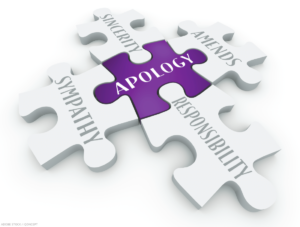 Mistakes are a part of life. In fact, they are a large part of my life. Whether uncovering inborn errors of immunity, teaching about diagnostic errors, identifying systemic lapses in high-quality care or correcting spelling errors in manuscripts, my entire being is centered on studying and examining mistakes. To a certain degree, I feel like I’ve gotten comfortable with the inevitability of mistakes, but this comfort has limits. I can rationalize a lot of imperfections in this world, but when it comes to personal shortcomings and how they may adversely affect people around me, I continue to feel uncomfortable.
Mistakes are a part of life. In fact, they are a large part of my life. Whether uncovering inborn errors of immunity, teaching about diagnostic errors, identifying systemic lapses in high-quality care or correcting spelling errors in manuscripts, my entire being is centered on studying and examining mistakes. To a certain degree, I feel like I’ve gotten comfortable with the inevitability of mistakes, but this comfort has limits. I can rationalize a lot of imperfections in this world, but when it comes to personal shortcomings and how they may adversely affect people around me, I continue to feel uncomfortable.
Naturally, that means I apologize a lot. I get a lot of apologies, too. About a month ago, I decided to reflect on what makes a good apology. Mustering all my quality improvement qualifications, I created a spreadsheet with five column headings: What was the apology? Who made the apology? How was the apology delivered? When was the apology delivered? And where does it go forward?
Because there is no curriculum for learning to apologize correctly and only a few resources with ambiguous advice, I decided that systematically documenting and examining apologies was worthwhile.
I updated the spreadsheet daily. Over 28 days, I wrote down 105 entries. Sixty-eight of them were rather small (e.g., I’m sorry I closed the door early. I’m sorry I’m late, everybody. I’m sorry I didn’t send that email earlier.). These incidents would probably be forgotten altogether, on both sides, if I hadn’t been counting them. Among the 37 that remained, 17 were apologies I delivered and 20 were ones I received.
To tell you the truth, I was initially surprised by the number of apologies. At the beginning, I anticipated about 20 in total over the month. But I quickly realized: I live in the Midwest, a notoriously polite region of the world, where apologies flow as freely as hellos, goodbyes and thank yous. The majority of the time, I’m not sure whether they even count as true apologies. Yet 37 is still a large number—more than one serious apology per day.
When I look at these 37, I see four core issues that seem to modulate what makes a good apology: 1) the heart and the brain; 2) framing the narrative; 3) the self and others; and 4) the speed of response. Let’s rheuminate on these …
From the Heart or From the Brain
It’s been said that a good apology comes from the heart.1 In my opinion, that is unambiguously true: A true apology reflects the innermost content of one’s heart. A true apology is meant to be a declaration of humility, unadorned by pretense. Certainly, that’s how I tried to approach apologies in the 17 instances in which I did the apologizing.
And yet, as I look at the 20 in which I was on the receiving end, the best and most effective apologies are the ones that seemed to come from the brain. The ones from the heart appeared unrefined. When I re-read them (or the notes that I took for verbal apologies), they’re short and simplistic. They lack the sense of consciousness and awareness that would be expected from someone who is truly apologetic. To be fair, I am not telepathic and can’t read anyone else’s consciousness or awareness, so that may not be true, but my impression is that there was much more that was going on in their mind before, during and after the apology.
Conversely, the least effective apologies I received over the course of the month were too cerebral in nature. These apologies had all sorts of details, quotes and rationalizations. They may have been sincere, but these apologies sounded more like justifications. Some of them even sounded like the apology was coerced or a standardized template statement was dictated to me.
Takeaway #1: Start with the heart, & follow with the brain.
My first takeaway is that apologies should start by demonstrating what is true—sincerity from the heart. Unconditionally saying “I’m sorry” is a good way to start an apology. Looking at the spreadsheet, diplomatic turns of phrases, like, “I regret …” or “I wish …” or “I feel bad” seemed to be half-measures, unlike simply saying “I’m sorry.” More to the point, that introduction shouldn’t have anything else around it—no “I’m sorry that …” or “I’m sorry but …” or (probably the worst) “I’m sorry if … .”
Taking a pause for both parties to register and reconnect may be the right way to address what happened. Then the brain can elaborate further to give specifics on why we feel sorry.
Takeaway #2: Search your own heart first.
Apologies also feel a little like an iceberg. Only 10% of it feels outwardly manifest, while 90% of the apology seems to be unsaid. In the 17 cases when I delivered an apology, I did feel like there was a lot of internal dialogue and exploration that I did not share with anybody else. As I looked at my apologies, I was searching back for similar instances and learning points. I was also delving deep down into asking myself why I was feeling something and challenging myself to engage in more empathic responses. Writing this down, it seems like it would take a really long time to do, but my experience is that this self-search happens pretty rapidly. Perhaps with practice, it can happen even more rapidly.
Framing the Narrative
A major dilemma I noticed in this spreadsheet is that apologies are meant to be both forward-facing and rooted in the past. Apologies help us move on from difficult moments, especially when dealing with close relationships, like those with family members and colleagues. Depending on what is being apologized for, things can, of course, be awkward, to say the least, and apologies can help make these situations less awkward in the long run.
Inspecting the list of apologies, the best ones I received were able to bridge the past and the future appropriately. They described clearly what happened in the past and tied it to a commitment to the future. By contrast, the ones that left me feeling unsatisfied were those that seemed to engage in some historical revisionism to drive a self-serving point.
Takeaway #3: Apologies reflect latent power dynamics.
It’s become clear to me from this reflection that apologies are inherently linked to ideas of power and influence. The greater the power differential, the more necessary it is for the apology to reflect equity. People in positions of greater power have to be clearer in what they are apologizing for, and people who lack such power are in the unenviable position of balancing between asserting themselves and maintaining their own position.
Apologies have to take this into consideration. When people in power deliver apologies, they should acknowledge how their power led to a transgression and probe deeper into how systems enable these mistakes to occur. People in power also have to lean in more to communicate exactly how such errors or mistakes can be prevented in the future. Dedication to follow-up is important to maintain the credibility of the apology.
Apologies Are Bidirectional
Another aspect of apologies that became abundantly clear is that they are not only meant for the other, but really for oneself. It’s clear that physicians are encouraged to apologize carefully to protect their own medicolegal liability. But this is subverts what an apology is ideally meant to be—a meaningful connection to mend a relationship damaged by a particular action.
At the same time, to say an apology is purely altruistic is a little misleading. A sincere apology is an act of catharsis. It’s a way to promote self-forgiveness and to muster the self-discipline to improve oneself. It’s an attempt to mend a fraying (or frayed) relationship by forging newer bonds of mutual interest and empathy.
Takeaway #4: Apology & grace are intertwined.
When I look at the 20 instances in which I received an apology over the month, I think about how important it was for me to react in a graceful manner. When I felt someone was truly empathizing, I also felt a need to reciprocate that sense of empathy. In just thinking about a few instances, I felt the muscles in my eyebrows relax as I saw evidence of that introspection. My go-to reflex has been, “It’s okay. It happens sometimes,” or “Don’t worry about it,” but maybe I need to be clearer in reciprocating the acknowledgment that something had happened and that there’s an effort to mend it.
Takeaway #5: Make time to apologize to oneself.
Another type of apology I didn’t document in my spreadsheet, but one that rings true, is the apology to oneself. There are times in which I apologize to myself for something I previously did that has impacted me today. It’s admittedly a weird dynamic, but it’s one that lets me recognize how much I’m growing as an individual. It also allows me to practice the art of delivering apologies and the art of receiving apologies. I suppose it is part of self-forgiveness.
The Speed of a Response
The last major dynamic I observed was that good, meaningful and therapeutic apologies often take time to craft, but need to be delivered promptly. Some errors should be apologized for immediately, but many others—those that involve delicate situations, for example—require some time for digesting. A knee-jerk reaction may be counterproductive and a sign of mindlessness. A delay in some cases may be just as bad, showing reluctance to acknowledge any wrongdoing.
Ultimately, this is an individualized decision. Among the 37 apologies that I documented over the month, the one with the longest delay was five months. Even though I wish it had been delivered earlier, I was grateful for the apology nevertheless. I’m not sure I would have felt that way if the apology had been delivered five days—or even five years—afterward.
Takeaway #6: Apologies are defined by action, not just words.
Even though we see apologies in their verbal or written form, I would contend that most apologies are actually actions. The words within an apology are meant to be a declaration of intent to change behavior. People who receive apologies are looking carefully at the sincerity of this declaration. An apologizer has to deliver on what they state for future apologies to be credible. At worst, if there are repeated episodes of apologies without any changes, it probably would have been best to avoid the apology to begin with.
Going back to the spreadsheet, the most feckless of all apologies are the “I’m sorry you feel that way” type, in large part because there is no action associated with those words. That type of apology forces someone else to take action, which is, in my opinion, deeply disingenuous.
So there we have it: 105 apologies over the course of a month. That was a lot of data to collate and to comb over, but I’m glad I did so because moving forward, I have a better understanding of what it means to apologize.
My insights are my own and may not necessarily apply to others, but I find it interesting that they align well with some of the advice for best practices on apologizing. For example, Marjorie Ingall and Susan McCarthy articulate six steps, many of which reflect what I’ve seen and felt.2 Another apology expert, Harriet Lerner, offers six ways to apologize.3 The late psychologist Aaron Lazare, PhD, crystallized four elements of a good apology.4 Nearly all of them overlap at certain points and diverge at others.
All these approaches are useful, but they are too formulaic for my tastes. An apology can’t be distilled into four, five or six orderly steps or methods. If it were that easy, we wouldn’t have so many issues with apologizing. Rather, apologies are meant to make us feel uncomfortable and force us to reconsider the ways we look at the world so we can remake it in a better way. Apologies are tools to mend fraying relationships and break off hurtful practices.
Good apologies aren’t easy, even for those of us who are well attuned to picking up errors in our professional and personal lives.
 Bharat Kumar, MD, MME, FACP, FAAAAI, RhMSUS, is the associate program director of the rheumatology fellowship training program at the University of Iowa, Iowa City, and the physician editor of The Rheumatologist. Follow him on Twitter @BharatKumarMD.
Bharat Kumar, MD, MME, FACP, FAAAAI, RhMSUS, is the associate program director of the rheumatology fellowship training program at the University of Iowa, Iowa City, and the physician editor of The Rheumatologist. Follow him on Twitter @BharatKumarMD.
References
- Corliss J. The art of a heartfelt apology. Harvard Health. 2021 Apr 13. https://www.health.harvard.edu/blog/the-art-of-a-heartfelt-apology-2021041322366.
- Ryan E, Kelly ML. Do you use these words when you apologize? It’s time to stop, researchers say. NPR. 2023 Jan 25. https://www.npr.org/2023/01/25/1150972343/how-to-say-sorry-give-good-apology.
- Sethi S, Schneider CM. You’re apologizing all wrong. Here’s how to say sorry the right way. NPR. 2021 Jun 15. https://www.npr.org/2021/06/02/1002446748/youre-apologizing-all-wrong-heres-how-to-say-sorry-the-right-way.
- Lazare A. Making peace through apology. Greater Good Magazine. Berkeley University of California; 2004 Sep 1. https://greatergood.berkeley.edu/article/item/making_peace_through_apology.



